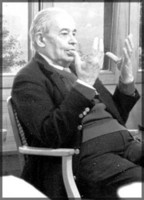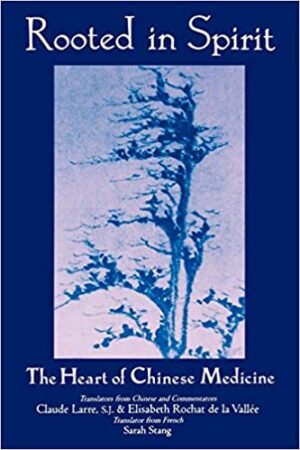 Father Larre was born in France in 1919. After taking a degree in Law at the Sorbonne, he entered a Jesuit Seminary at the age of 20. He spent five years in China at a very turbulent point in its history (1947-52), finally leaving for Hongkong when all foreign priests were expelled. From there he travelled to the Philippines, before returning to France to study Chinese Philosophy at the and afterwards spending a year in Japan. In 1957 he left for what was to be a nine year stay in Vietnam, first as Director of the Jesuit School for Vietnamese Language and later as Professor of Oriental Philosophy at the universities of Saigon and Dalat. His links with Vietnam lasted throughout his life, in his dedication and support for Vietnamese refugees in France.
Father Larre was born in France in 1919. After taking a degree in Law at the Sorbonne, he entered a Jesuit Seminary at the age of 20. He spent five years in China at a very turbulent point in its history (1947-52), finally leaving for Hongkong when all foreign priests were expelled. From there he travelled to the Philippines, before returning to France to study Chinese Philosophy at the and afterwards spending a year in Japan. In 1957 he left for what was to be a nine year stay in Vietnam, first as Director of the Jesuit School for Vietnamese Language and later as Professor of Oriental Philosophy at the universities of Saigon and Dalat. His links with Vietnam lasted throughout his life, in his dedication and support for Vietnamese refugees in France.
On his return to France, he pursued further Chinese studies at the Sorbonne culminating in his doctorate in Philosophy and Sinology. His dissertation was on Huainanzi chapter 7, Jing Shen Xun, A Commentary on Jingshen.
At the age of 52, in 1971, he founded the Ricci Institute in Paris, a centre for research on the Chinese language and civilisation. In 1976 The French Dictionary of the Chinese Language was jointly published by the Ricci Institutes of Taipei and Paris. It contained 6,500 characters and nearly 50,000 compounds. The last ten years of his life were focussed especially on the production of the Grand Ricci Dictionary of the Chinese Language, the largest dictionary of Chinese into any European language. It was finally published a month after his death, in seven volumes, and contains 13,500 single characters and 300,000 Chinese compounds.
In 1977 he made a translation of Laozi’s Daodejing, returning to the same subject with a new translation in 1994. He was fascinated by its subtlety and simplicity and would often quote it by heart in Chinese medical seminars to illustrate the deeper origins of what became the principles of medicine. In 1981 he wrote Les Chinois, a study on the spirit and behaviour of the Chinese as shown in their books and their life from their origins to the end of the Ming Dynasty. It displayed his deep knowledge of the Chinese culture and its people, their language, philosophy, classics, poetry, painting, medicine, inventions, war, government and history. His specific publications on Chinese medicine (some co-authored) include the Survey of Chinese Medicine, The Way of Heaven (Suwen chapters 1 and 2), Rooted in Spirit (Lingshu chapter 8 and Suwen chapters 1-11). With Elisabeth Rochat he has also co-authored translations and commentaries on Zhuangzi and Huainanzi, and presented a study of the Mawangdui funeral banner.
With the founding of the European School of Acupuncture, in Paris, in 1976, he began a period of teaching on Chinese philosophy, Chinese language and traditional Chinese medicine in various countries in Europe, the United Kingdom, Canada and the United States. The European school of Acupuncture has been running regular programmes ever since.

